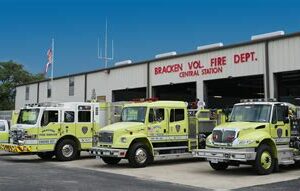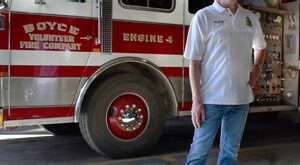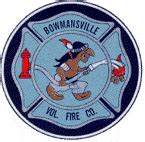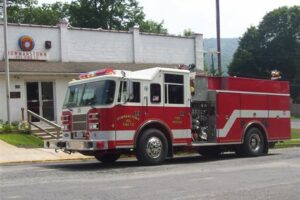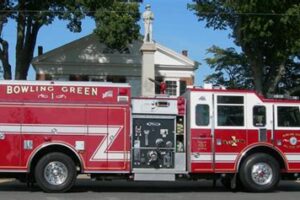Table of Contents
Are you interested in giving back to your community? Learn how to volunteer at a fire station and make a difference. Discover the steps to become a volunteer firefighter, the training involved, and the rewarding experiences you can gain. Joining a fire station allows you to support your local firefighters and contribute to public safety. Find out more now!
Are you ready to make a difference in your community? Do you have a passion for helping others and a desire to contribute to public safety? If so, volunteering at a fire station might be the perfect opportunity for you. Whether you are a seasoned firefighter or someone who simply wants to lend a hand, this article will guide you through the process of becoming a volunteer firefighter. From training programs to daily duties, we will explore the ins and outs of this noble profession. So grab your gear and get ready to embark on an exhilarating journey that will not only challenge you physically and mentally but also leave a lasting impact on the lives of those around you.
Becoming a Volunteer Firefighter: A Rewarding Experience
Volunteering at a fire station is not only a noble endeavor, but also an opportunity to make a significant impact in your community. Being a volunteer firefighter requires dedication, courage, and a genuine desire to help others. If you are considering becoming a volunteer firefighter, this article will guide you through the necessary steps to get involved in this rewarding experience.
Finding a Local Fire Station
The first step towards volunteering at a fire station is to find the nearest one in your area. You can easily locate your local fire station by using online directories, reaching out to your municipal office, or contacting your local fire department. Once you have identified the fire station, it’s time to reach out and express your interest in volunteering.
Contacting the Fire Station
After identifying the fire station you wish to volunteer at, it’s essential to establish contact with the station’s administration. You can either call or visit the fire station during their non-emergency hours to inquire about volunteer opportunities. Alternatively, some fire stations may have an online form or email address specifically for volunteer inquiries.
Attending an Information Session
Many fire stations hold information sessions for potential volunteers to learn more about the organization, its requirements, and the roles and responsibilities of a volunteer firefighter. Attending an information session will provide you with valuable insights and allow you to ask any questions you may have. It’s an excellent opportunity to gauge your interest and commitment level.
Completing the Application Process
Once you have decided to move forward with volunteering at the fire station, you will need to complete the necessary application process. This typically involves filling out an application form, providing personal information, and in some cases, undergoing a background check. The application process ensures that you meet the requirements and are a suitable candidate for volunteering.
Training and Certification
Volunteer firefighters undergo specific training to acquire the skills and knowledge necessary for their role. The fire station will provide training sessions that cover various areas, such as fire suppression techniques, first aid, emergency response protocols, and equipment operation. It is crucial to attend these training sessions diligently and obtain the required certifications to ensure your readiness to serve.
Active Participation
As a volunteer firefighter, active participation within the fire station is key. This involves attending regular meetings, drills, and trainings to stay up-to-date with the latest practices and techniques. Additionally, being available for emergency calls and shifts as per the station’s schedule is essential. Active participation demonstrates your commitment and dedication to the role.
Building Relationships with Peers
Volunteering at a fire station provides an excellent opportunity to build strong relationships with your fellow firefighters. Building camaraderie and trust within the team fosters a supportive environment and enhances the effectiveness of emergency response. Take the time to connect with other volunteers and professionals at the fire station, as they can provide guidance, mentorship, and friendship throughout your volunteering journey.
Continuing Education and Growth
Firefighting techniques and technologies are constantly evolving. To stay updated and enhance your skills, it is important to continue your education even after completing the basic training. Attend workshops, seminars, and conferences related to firefighting and emergency response. Engage in ongoing professional development opportunities to expand your knowledge and expertise in the field.
Supporting Your Community
Volunteering at a fire station allows you to make a significant impact on your community. By dedicating your time and skills to help others during emergencies, you contribute to the safety and well-being of your neighbors. Whether it’s extinguishing fires, providing medical assistance, or educating the community about fire safety, your commitment as a volunteer firefighter plays a vital role in supporting and protecting your community.
Rewards of Volunteering
Volunteering at a fire station is not just about the impact you make on others but also about personal growth and fulfillment. It provides an opportunity to develop valuable skills such as teamwork, leadership, communication, and problem-solving. Moreover, the sense of pride and accomplishment gained from serving your community during critical moments is truly rewarding and unparalleled.
Becoming a volunteer firefighter requires dedication, training, and a genuine passion for helping others. By following these steps, you can embark on an incredible journey of service, making a positive difference in your community. Take the first step today by reaching out to your local fire station and expressing your interest in becoming a volunteer firefighter.
How to Volunteer at a Fire Station: Taking the First Step in Serving Your Community
Understanding the Important Role of a Fire Station Volunteer:
Volunteering at a fire station requires commitment, dedication, and a genuine desire to serve your community. As a volunteer, you will play an essential role in supporting the fire department’s operations, assisting with various tasks both on and off the scene of emergencies. By contributing your time and skills, you will have a direct impact on the safety and well-being of your fellow community members.
Researching and Identifying Suitable Fire Stations:
Begin your journey by researching and identifying fire stations within your local area that accept volunteers. Look for fire departments with a strong volunteer program in place, indicating a higher likelihood of receiving proper training and support. Reach out directly to the fire stations or explore their websites to inquire about volunteer opportunities and requirements.
Meeting Eligibility Requirements:
Fire departments typically have specific criteria that interested individuals must meet to become a volunteer firefighter. Ensure you are of legal age, have a valid driver’s license, and possess a clean criminal record. Some fire stations may also require applicants to pass a physical fitness test and participate in an interview process.
Becoming Familiar with Volunteer Duties:
Fire station volunteers take on a range of duties that support the fire department’s core mission. These duties may include equipment maintenance, administrative tasks, community outreach efforts, and assisting firefighters during emergencies. Engage with current and veteran volunteers to gain insights into the various responsibilities and demands you can expect as a volunteer.
Acquiring the Necessary Training and Certifications:
To be effective and safe in your volunteer role, you must undergo training and obtain relevant certifications. Fire departments often provide rigorous training programs that cover basic firefighting techniques, emergency medical response, and other essential skills. Commit yourself to the training process, as it will equip you with the knowledge and confidence needed to handle challenging situations.
Cultivating Teamwork and Building Relationships:
Volunteer firefighting requires strong teamwork and the ability to work harmoniously with your fellow volunteers and career firefighters. Embrace opportunities to attend drills, exercises, and team-building activities to foster camaraderie and develop trust with your teammates. Building relationships with experienced firefighters can provide invaluable mentorship and guidance throughout your volunteer journey.
Committing to Regular Shifts and Availability:
Fire departments rely on the dedication and availability of their volunteers, as emergencies can happen at any given moment. Discuss your availability and commitment level upfront with the fire station, ensuring mutual understanding regarding the number of shifts per month or other requirements. Consistency and reliability are essential traits for successful fire station volunteers.
Embracing the Rewards and Challenges:
Volunteering at a fire station offers immense personal rewards, such as making a positive impact on your community and honing valuable skills. However, it is crucial to understand and be prepared for the challenges that come with the role, including intense physical demands, emotionally challenging situations, and a potential impact on work-life balance. By embracing these rewards and challenges, you’ll contribute to the safety and well-being of your community, leaving a lasting, positive legacy.
In today’s society, where disasters and emergencies can strike at any moment, the importance of having well-trained firefighters cannot be overstated. These brave men and women put their lives on the line every day to protect and serve their communities. But have you ever wondered how you can contribute and make a difference at your local fire station? Volunteering at a fire station is not only a noble act but also an opportunity to learn invaluable skills and become part of a tight-knit firefighting community.
Here are some practical steps to follow if you’re interested in volunteering at a fire station:
Research the fire station: Start by identifying the fire station nearest to your location. Gather information about their volunteer program, requirements, and any specific areas they may need assistance with. This will help you understand their needs and determine if it’s the right fit for you.
Contact the fire station: Reach out to the fire station either in person or by phone to express your interest in volunteering. Ask to speak with someone in charge of the volunteer program or the station chief. Be polite, professional, and explain your motivation for wanting to volunteer. This initial conversation will provide you with more details about the application process.
Complete the application process: Once you’ve made contact, you’ll likely be required to fill out an application form. This form may include personal information, references, and questions about your availability and skills. Take your time to complete the application accurately and thoroughly.
Undergo a background check: Fire stations prioritize the safety and security of their personnel and community. Therefore, it’s common for them to conduct background checks on potential volunteers. This may include criminal history, driving record, and other relevant screenings.
Attend an interview or orientation: If your application is successful, you may be invited to an interview or orientation session. This is an opportunity for the fire station to get to know you better, assess your commitment and dedication, and ensure that you understand the responsibilities and expectations of being a volunteer firefighter.
Complete training: Firefighting is a specialized field that requires proper training. As a volunteer, you’ll likely be required to complete training courses to learn essential skills such as CPR, first aid, fire safety, and basic firefighting techniques. These trainings will equip you with the knowledge and confidence needed to assist the professional firefighters.
Commit to a schedule: Once you’ve been accepted as a volunteer, it’s important to commit to a regular schedule. Fire stations rely on their volunteers to be dependable and available during specific shifts or times of need. By adhering to a consistent schedule, you demonstrate your reliability and dedication to the team.
Be prepared for physical demands: Volunteering at a fire station can be physically demanding. Firefighters often engage in strenuous activities such as carrying heavy equipment, climbing ladders, and working in challenging environments. It’s crucial to maintain a good level of fitness and be prepared for the physical demands that come with the role.
Show respect and follow instructions: As a volunteer, it’s essential to show respect towards the professional firefighters and follow their instructions diligently. Always listen and learn from their expertise, ask questions when needed, and maintain a positive attitude. Remember, you are there to support and assist them in their vital work.
Continuously learn and grow: Volunteering at a fire station offers endless opportunities for personal and professional growth. Take advantage of training programs, workshops, and educational resources provided by the fire station. Continuously strive to improve your skills, expand your knowledge, and stay up-to-date with the latest firefighting techniques and safety protocols.
Volunteering at a fire station is an incredible way to give back to your community and make a meaningful impact. By following these steps and embracing the responsibilities that come with the role, you can become an integral part of the firefighting family, working alongside dedicated professionals to keep your community safe.
Thank you for taking the time to read this article on how to volunteer at a fire station. We hope that the information provided has been insightful and helpful in guiding you towards making a difference in your community. Volunteering at a fire station is not only a rewarding experience but also a noble way to serve and support those who dedicate their lives to keeping us safe. Whether you are looking to pursue a career in firefighting or simply want to give back, volunteering at a fire station can be a life-changing endeavor.
If you are interested in becoming a volunteer firefighter, there are a few steps you can take to get started. First and foremost, it is essential to research the requirements and qualifications of the fire department in your area. Each department may have different criteria for volunteers, such as age restrictions, physical fitness standards, and background checks. By familiarizing yourself with these prerequisites, you can determine whether you meet the necessary criteria and if volunteering at a fire station is the right path for you.
Once you have determined that you meet the requirements, the next step is to reach out to your local fire department. This can typically be done by visiting their website or giving them a call. It is advisable to express your interest in volunteering and inquire about any upcoming orientation sessions or training programs. Fire departments often provide structured training programs for prospective volunteers to ensure they are equipped with the necessary skills and knowledge to assist during emergencies. Attending these sessions not only prepares you for the role but also allows you to familiarize yourself with the station, equipment, and protocols.
In conclusion, volunteering at a fire station is an excellent opportunity to make a positive impact in your community while gaining valuable skills and experiences. By taking the initiative to research the requirements and reach out to your local fire department, you can embark on a fulfilling journey as a volunteer firefighter. Remember, the dedication and commitment of these brave individuals deserve our utmost respect and support. By volunteering at a fire station, you are not only contributing to the safety and well-being of your community but also joining a noble profession that thrives on selflessness and heroism. So, take the first step today and make a difference by becoming a volunteer firefighter.
.
People Also Ask about How To Volunteer At A Fire Station:
1. What qualifications do I need to volunteer at a fire station?To volunteer at a fire station, you typically need to meet certain qualifications, which may vary depending on the station’s requirements. These qualifications often include being at least 18 years old, having a high school diploma or equivalent, passing a background check, and possessing a valid driver’s license. Additionally, some fire stations may require specific certifications such as CPR or first aid training.
2. How can I find fire stations that accept volunteers near me?To find fire stations that accept volunteers near you, you can start by contacting your local fire department or visiting their website. They will provide information on their volunteer programs, eligibility criteria, and the application process. You can also reach out to community organizations, fire service associations, or perform an online search to identify fire stations in your area that are open to volunteers.
3. What kind of tasks can I expect to do as a volunteer at a fire station?As a volunteer at a fire station, you may be involved in various tasks that support the firefighters and the smooth operation of the station. These tasks can include assisting with administrative duties, maintaining equipment and facilities, participating in fire prevention education programs, conducting community outreach, and supporting emergency response efforts during incidents. The specific tasks assigned to volunteers can vary based on the needs and policies of each fire station.
4. Is any training provided for volunteers at fire stations?Yes, fire stations usually provide training for their volunteers to ensure they are equipped with the necessary skills and knowledge. This training may cover areas such as basic firefighting techniques, emergency medical procedures, the proper use of equipment and tools, communication protocols, and safety measures. The extent of the training provided will depend on the specific requirements of the fire station and the level of involvement expected from the volunteers.
5. Are there any time commitments or schedules for volunteer work at fire stations?Fire stations often have varying time commitments and schedules for volunteers. Some stations may require a certain number of hours per week or month, while others may offer more flexible arrangements. It’s important to inquire about the expected time commitment during the application process to ensure it aligns with your availability and other commitments. Additionally, some stations may have specific shifts or on-call rotations that volunteers need to be aware of.
6. Can volunteering at a fire station lead to a career in firefighting?Volunteering at a fire station can certainly provide valuable experience and exposure to the firefighting profession. While it does not guarantee a career in firefighting, it can be a stepping stone towards pursuing such a path. Many firefighters start their journey as volunteers, gaining practical knowledge, building relationships with professionals in the field, and potentially accessing training opportunities that can enhance their chances of becoming a professional firefighter in the future.
7. What personal qualities are desirable for volunteering at a fire station?Volunteering at a fire station requires certain personal qualities that can contribute to effective teamwork and service. Desirable qualities include strong communication skills, the ability to follow instructions, physical fitness, adaptability, problem-solving skills, and a commitment to public safety. Additionally, being punctual, reliable, and having a positive attitude are highly valued traits that can make a difference when serving as a volunteer at a fire station.

